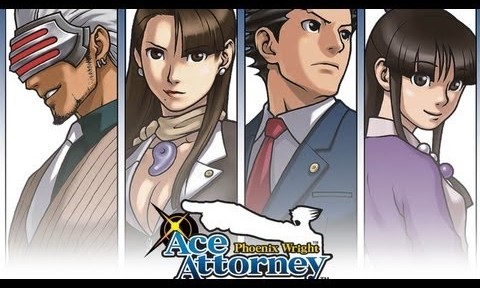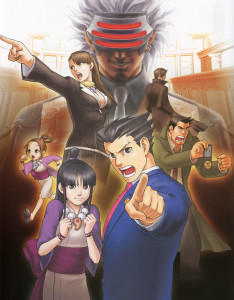
(This review may contain spoilers for the following series. If you have not seen the series before, please exercise caution before viewing this post. You have been warned.)
Back in 2005, I was sent a disk through Nintendo Power with trailers for Zelda, Mega Man X, Viewtiful Joe, and other Gamecube, Nintendo DS, and GBA titles. Mixed in all this, was a game where you yourself could become a lawyer and fight in the courtroom. This game, titled Phoenix Wright: Ace Attorney, captured my attention and I immediately grew attached to the game.
It would be another year before I started up the first game in the series, and let me tell you, I enjoyed every minute of it. The characters, the story, and the mysteries all came together so well and I recall the best moments in the game. Unfortunately, I wouldn’t come across the next few games until much later, but now that I’ve gathered all three, what can one say about these games? With such a memorable story, cast, and direction, you can’t go wrong, can you?
(Also, I consider the first three games in the series to be a trilogy. All the games somewhat connect and the story doesn’t wrap up until the third game, and the mechanics don’t drastically change either in these games,..)
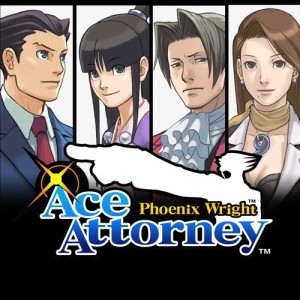
Starts it All!
Phoenix Wright consists of 5 cases, each with their own set of investigations and evidence. You’re shown the murderer in the first two cases, as an example of how this game is going to work and to show you that the person you’re defending isn’t really the true murderer. In each case, save for the first one, you’re given time to investigate the murder site, interrogate witnesses, talk with your client, and find the truth. Additionally, you must gather evidence to support your theory and back up your claims. Once you’ve investigated and questioned everything, you’re then ready to take on the second part of the game, where the truth often comes out, the Courtroom. During these court sessions, you must use the evidence you’ve found to point out contradictions in witness’ testimony and destroy their lies. Quite often, this ends up revealing that the true culprit is closer than you think, and of course, the writing really shines with each character’s personality and unique traits.
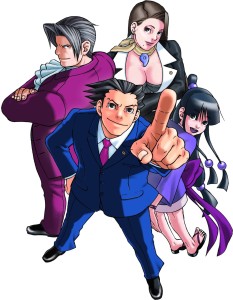
Of course, this isn’t always easy. While you have to point out your client’s innocence to the court, you’ve got one jackass who will stop at nothing to prove your client Guilty. This person represents the prosecution, and if you think you’ve got the puzzle solved, you better be able to back it up with evidence or the prosecution will rip you to shreds. Luckily, while the prosecutors in the game come off as total dicks, it really fleshes out the story and aids in the conquest for the truth. In addition, the arguments between the two sides really move the story and without this conflict the game wouldn’t have moves as smoothly as it does.
The main prosecutor in the first game is Miles Edgeworth, a somewhat new prosecutor who was trained by Manfred von Karma, who has never lost a case in 40 years. With Edgeworth being a prodigy and trained by von Karma, he can come off as intimidating at times. However, soon you realize there’s more to Edgeworth and Wright than they let on, and you soon realize that Edgeworth’s a well-designed character who develops and learns throughout the series. He’s definitely one of my favorite characters.
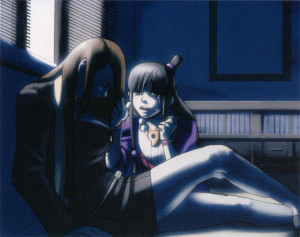
Unfortunately, there are a few gripes that I have with this series. The main issue I have with some of the cases is that certain cross-examinations require your thinking to be completely in tune with the game’s logic. The game follows some strange logic in certain cases, and it can cause problems during certain cross-examinations. In addition, you may have the whole puzzle figured out, but unsure as to which evidence fully supports your claim. While these aspects don’t bring down the game too much, they are minor issues.
The last case in the first game was an addition to the DS port of the game. Surprisingly, these games were originally released on the Gameboy Advance in Japan back in 2001, before coming to the states in 2005 on the Nintendo DS. This new case showcases some of the features the DS can utilize (Mainly the touch screen) and adds some new mechanics that really spice up the gameplay. However, I do feel as though the last case really drags on and while entertaining, holds a lot of confusing areas during the exploration portion of the case. Fortunately, the story really wraps up the first game while leaving some threads open that won’t be solved until the later games…
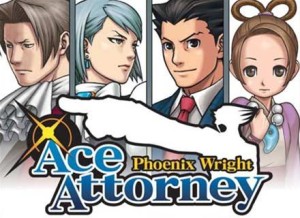
The second game, Justice for All, and the last game, Trials and Tribulations, don’t deviate from the formula that makes the game great. There are a few changes, but nothing that makes or breaks the game. As with the first game, the first case is always a semi-tutorial level with a relatively simply plot, with the second case really getting the game moving,
Justice for All contains four cases, and holds the biggest change from the first game. In the first game, Phoenix has a life counter which goes down when you make mistakes during the trial. This counter resets after every save point. However, Justice for All started the trend of a Life Meter, which goes down when you make mistakes not only during the court session, but also during the unlocking of Psyche-Locks, which occurs during the investigation portion of the case. The main issue I have with this new mechanic is that your Life Meter does not regenerate at the save points of the case. Which means, if you have one portion of your meter during the trial phase, you will only have one shot every time you start that trial over again after you mess up and have to reset. Also, the text does not let you skip until after you’ve beaten the case, so you have to go through text you’ve already read just to get back to the point you were at before you failed. In the game’s defense, there is a pseudo-save system where you can save during the trial, but it can still be a bit of a downer when you’re always on edge because you messed up too many times.
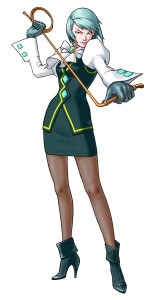
Now, you may ask, how do you refill your Life Meter now? One really neat addition to Justice for All is the new Psyche-Lock system. During the second case, you’re given the ability to see locks around a witness when they aren’t telling the truth. Knowing this, you can now press and present evidence outside of the trial to reveal their secret and understand the truth. Some locks are really easy, and some contain up to four or five locks, but all in all the locks are a great addition and add to the experience. Also, once you’ve unlocked the truth, you gain a portion of your Life Meter back, and the game is really generous when handing back life.
Justice for All also brings about the trend of introducing a new prosecutor for each game. In this game, the main prosecutor is Franziska von Karma, daughter of Manfred von Karma whom you won against in the last case of the first game. She has apparently come from Russia for revenge, seeing as defeating you to be the only true way to restore honor to her family name. This is proven to be a false assumption by Phoenix later, who learns of the true reason she has come to beat Phoenix. All in all, I feel as though Justice for All is the weakest game in the series. With the third case, which really drags and doesn’t appeal to many (Clowns…), and von Karma doesn’t appear to be the most entertaining of the prosecutors, the game rates the lowest out of the three. However, the game is still fantastic, but let’s just say that the next game really blows this one out of the water…

Trials and Tribulations really proves to be the best game in the trilogy, and the game shines because it doesn’t change anything from Justice for All. However, the game does contain the best cases in the game with the best writing in the series. The Psyche-Locks are back, along with the Life Meter, but the game also provides another new twist, you can now play as Mia Fey, Phoenix Wright’s mentor, during two cases in the game. This correlates to the new stories being told in the game, and slowly the game starts taking all the open ends in the previous games and wraps them up with a nice little bow. There were threads that I didn’t even think about that were left open that begin to be wrapped up in this game.
Trials and Tribulations takes the concept of ending with a bang to heart, and the last episode consists of the some of the best writing in a video game I know of. The Phoenix Wright games all end with good cases, but this last case really concludes the trilogy and ends the series quite nicely, Of course, the series isn’t over now, but these new stories are essentially sequels to the original trilogy and will never reach this point of awesome again.
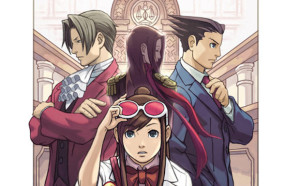
In addition, the new prosecutor, Godot, is probably the most entertaining out of all the prosecutors in the trilogy. There’s never a dull moment with Godot, and he easily has one of the most relaxing and chill theme songs of the three. Edgeworth is a mighty fine prosecutor, and he makes his appearance as always in this game as well, but Godot really takes the cake with best prosecutor.
Specific cases aside, the Phoenix Wright games are ripe with nods to popular culture and even a degree of ‘memes.’ All the characters in the game have their own style of humor and funny quirks, and really seems like interesting characters. In fact, there are certain characters who show up at least once in every game, and I’m not referring to the main characters either. Quite often will a character make a reference to an earlier case or earlier game, and the games really compliment each other as a whole. As always, the writing in all the games are superb and the game really deserves a read just for the writing and localization alone.
However, I’ve yet to address another major positive of the series. The series’ soundtrack consists of some amazing tracks and even with the GBA limitations, the soundtrack holds up even today. Most of the music really fits and adds that extra dimension to the game when you’re kicking the prosecution’s ass during a trial, and will be stuck in your head for days to come. In addition, each game contains it’s own variation of the main themes, with the second game being the weakest.
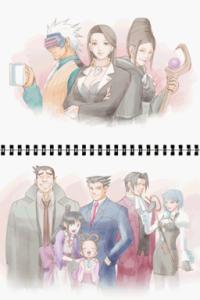
Of course, this game isn’t meant to be taken as a true court simulator, and there are quite a number of situations that really can’t happen in real life. However, the game is outstanding when you look beyond that and appreciate the game at face value. Simply put, if you own a Nintendo DS or even an iPhone, the Phoenix Wright games are worth every penny. Of course, the game doesn’t consist of a lot of gameplay, as the game is truly enjoyed by reading and solving the major puzzle in each case, so it’s not for action gamers who want to spend their time playing games shooting or platforming. However, if you want a good story, with interesting characters and good humor, this game is for you.
-Ace
